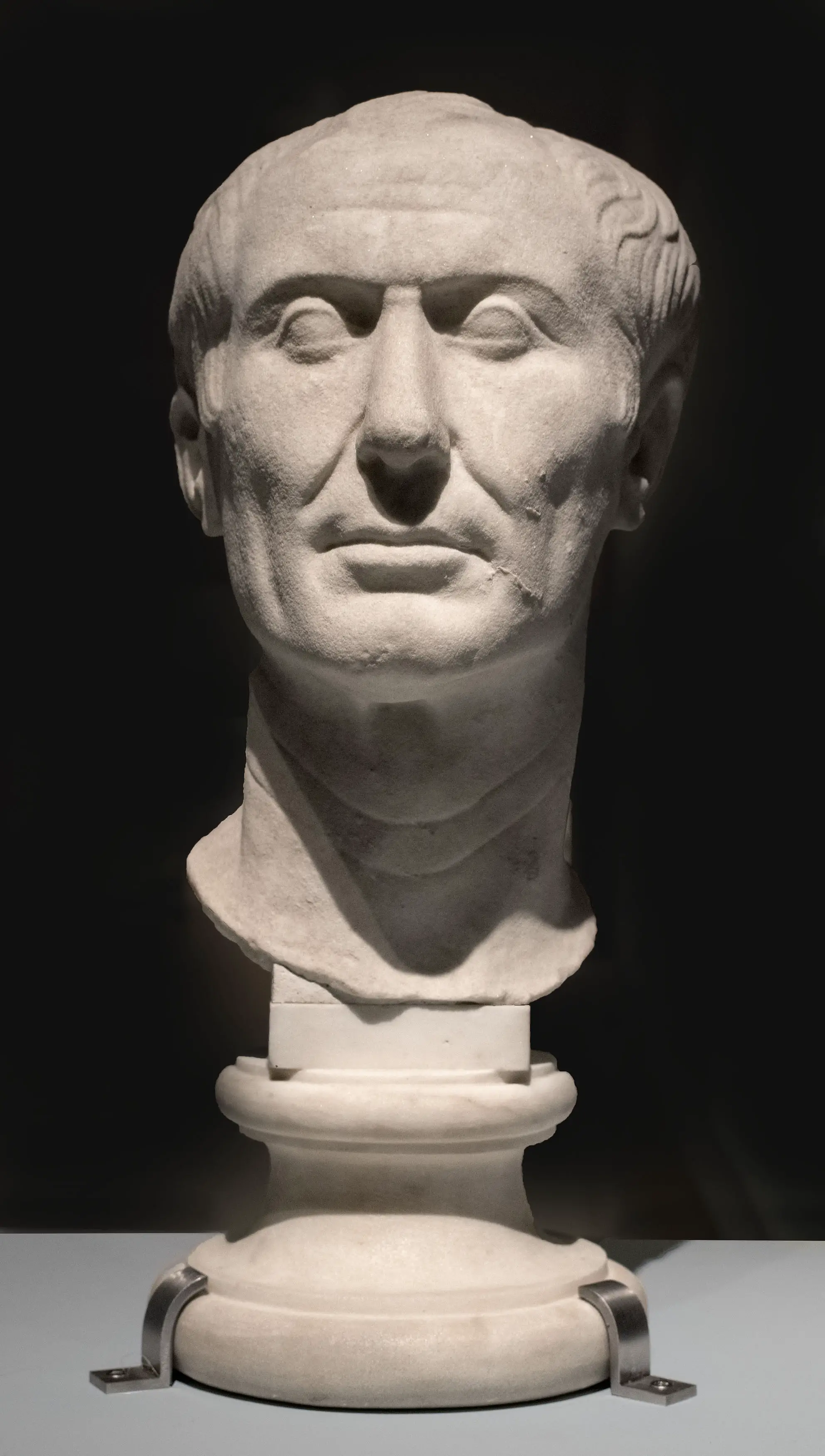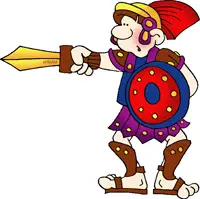Julius Caesar
Gaius Julius Caesar, known as Julius Caesar, was a military and political leader in the Roman Republic. He was instrumental in ending the Roman Republic.
He became the dictator-for-life after defeating his enemies. Julius Caesar was liked by the people or plebeians but not liked by the wealthy known as patricians in ancient Rome.

Early years
Gaius Julius Caesar was born around 100 B.C.E. in the city of Rome. His father was also named Gaius Julius Caesar. He was the Praetor of the Asia Province. His mother, Aurelia Cotta, was from an aristocratic family.
The family could trace their roots to the founding of Rome and is considered to be part of the Julio-Claudian Dynasty.
He grew up in a modestly wealthy household, but his family was not rich. When Julius Caesar was a child, he learned how to read and write in Latin. He studied Roman law, history, and learned to be an orator.
At the age of 16 years old, his father passed away. This made Julius Caesar responsible for providing for his mother and sister, Julia. He thought about joining the priesthood to support his family.
But he needed to be married to a patrician woman. He was in love with a plebeian woman at the time. Caesar decided to break off the marriage. Instead, he married a patrician woman named Cornelia. After his marriage, Caesar became the High Priest of Jupiter.
Fleeing from Sulla
After becoming the High Priest of Jupiter, Caesar’s family was targeted by Sulla, who had become dictator of Rome. Sulla began to purge families that did not fall in line with his politics.
Sulla held to the ideology of supporting patrician values that favored the rich in Rome. Julius Caesar was raised to support more rights for plebeians and the lower class. Soon Sulla was looking for Julius Caesar. Julius Caesar then fled Rome.
Although he was later able to return, Julius Caesar lost his title as High Priest of Jupiter, and his wealthy wife’s estate was taken from them.
With no way to support his family, Julius Caesar joined the military. He proved to be a good soldier. Julius Caesar was awarded many medals for saving lives in battle. He soon found himself being promoted through the ranks. He was then chosen to secure numerous ships from Bithynia.
Julius Caesar returned to Rome after the death of Sulla. Once in Rome, he entered politics. He was a good orator and rose through the political ranks quickly. Julius Caesar became a tribune and then elected quaestor in 69 B.C.E.
He also made powerful friends while pursuing new positions in the government. His friends included Pompey the Great and a wealthy patrician named Marcus Licinius Crassus.
Julius Caesar was appointed the governor of Spain or Hispania. He commanded four Roman legions in Hispania and was successful in defeating rebellions. After his conquest of Hispania, he returned to Rome.
Becoming Consul of Rome
In 60 B.C.E. Julius Caesar ran for consul and won. Consul was the highest position in the Roman Republic government. In the Roman Republic, there were two consuls elected each year to serve one-year terms.
His relationships with Pompey the Great and Crassus flourished during his consul. Julius Caesar helped his daughter Julia marry Pompey to further their family ties. The three men formed the First Triumvirate of Rome. Together the three men ruled Rome.

The First Triumvirate
Through an agreement with Pompey and Crassus, Julius Caesar became the governor of Gaul. He was instrumental in fighting against the Germanic tribes that wanted to invade Gaul.
After defeating the Germanic tribe’s Roman territory now reached the North Sea. Now Julius Caesar set his sights on Britannia in 55 B.C.E. and was able to conquer the island.
Politics in Rome
During his absence in Rome, the political situation became bad. A civil war was breaking out. Crassus had been killed in 54 B.C.E. in a battle against the Parthians. The same year Julia, his daughter, died in childbirth.
Pompey used these circumstances to take over total control of Rome as the sole military leader. These actions fractured the First Triumvirate. In 50 B.C.E., Pompey ordered Julius Caesar to disband his Roman legions.
Julius Caesar decided not to return to Rome. Instead, he took his Roman legions and crossed the Rubicon River. Julius Caesar then marched on Rome in 49 B.C.E., but Pompey had already fled to Spain.
Caesar followed defeated Pompey’s army in Spain. For the next 18 months, Pompey fought against Julius Caesar’s Roman legions. Eventually Pompey traveled to Egypt for safety. But Pompey was killed by the Egyptian Ptolemy VIII, who presented Pompey’s head to Julius Caesar upon his arrival.
This did not sit well with Julius Caesar, and he formed an alliance with Queen Cleopatra. His Roman legions then battled the Egyptian army for more than six months. Julius Caesar and Cleopatra defeated the Egyptian army in the Spring of 47 B.C.E. He left Cleopatra as queen and took his army through Asia Minor, defeating any enemies that were aligned with Pompey.
Dictator for life
In 46 B.C.E. Julius Caesar returned triumphantly to Rome. He was immediately made Dictator-for-life by the Roman Senate. While he was dictator-for-life, Julius Caesar installed Senators that were loyal to him.
This made passaging laws easier. He was able to change the land reform laws to favor the poor. He constructed numerous buildings, temples, and installed the Julian calendar, which we use today.
Ides of March
On the 15th of March, 44 B.C.E. Julius Caesar was assassinated on the steps of the Roman Senate. The two men responsible were named Cassius and Brutus.
They were hired by patrician senators that feared Julius Caesar had favored the common people too much. The day of his killing is known as the Ides of March.
Future Succession
While in Egypt, Julius Caesar had an affair with Cleopatra producing a child named Caesarion. She had hoped that Caesarion would one day be named dictator-for-life.
But Julius Caesar adopted his grandnephew named Octavian. Two decades later, Octavian became the first Roman Emperor of the Roman Empire.
Important facts about Julius Caesar
- Gaius Julius Caesar was born in 100 B.C.E. to an aristocrat family. They were not considered wealthy, but they were well off financially. He learned how to read and write as a child. He studied Roman law and history. He liked to write too.
- His father died when he was 16 years old. Julius Caesar then became the High Priest of Jupiter to support the family.
- When the treason trials by Sulla began, Julius Caesar fled Rome. He then joined the Roman army. He rose quickly through the ranks.
- His first political position was a tribune. Then he became a quaestor for Hispania in 69 B.C.E.
- Julius Caesar made powerful friends with Marcus Crassus and Pompey the Great. They formed the First Triumvirate when Caesar was elected consul in 60 B.C.E.
- After being a consul, he became governor of Gaul. Civil war broke out in Rome after Crassus died in battle, and Pompey took control of Rome. In 49 B.C.E. Julius Caesar marched on Rome.
- He defeated Pompey’s army in Egypt. He placed Cleopatra in charge of Egypt. They had a child together named Caesarion. He also adopted Octavian, his grandnephew. Octavian would become the first Roman Emperor of the Roman Empire two decades later.
- Julius Caesar became dictator-for-life in 46 B.C.E. He installed the Julian calendar during his reign. He also reformed land policy to favor the common people.
- He was assassinated on the 15thof March in 44 B.C.E. The day is known as the Ides of March.
Questions
What family dynasty was Julius Caesar associated with?
Julio-Claudian Dynasty
Besides Julius Caesar, which two other people formed the First Triumvirate?
Pompey the Great and Marcus Crassus
Where did Julius Caesar finally defeat Pompey the Great?
Egypt
What is the name of the calendar Julius Caesar installed in Rome?
Julian calendar
What is the name of the day that Julius Caesar was assassinated on?
Ides of March



